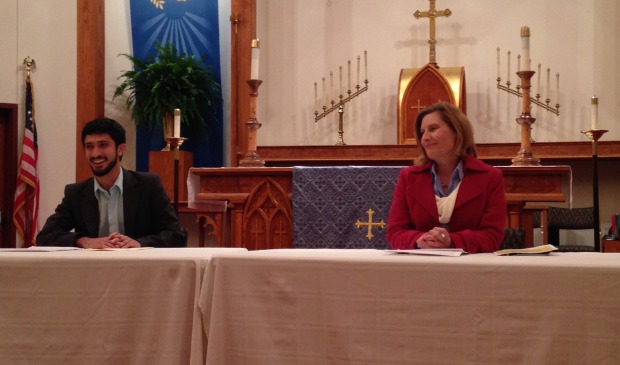Under scrutiny, District 4 candidates debate
Tuesday, December 2, 2014 by
Kara Nuzback On first day of early voting, the two remaining candidates in District 4 sat down to debate. Even though both focused on their plans for keeping North Austin affordable, their differences were apparent.
Greg Casar, 25, a community organizer, led the election on Nov. 4 with 39 percent of the vote. His opponent, Laura Pressley, 51, is the owner of Pure Rain LLC, a bottled-water company; she nabbed 22 percent of the vote. The two went head-to-head at a candidate forum Monday night at St. John’s Episcopal Church, hosted by the North Austin Community Newsletter.
Corporate subsidies were a point of contention throughout the debate, with both candidates saying they opposed corporate incentives, but with Pressley insisting Casar lobbied for million of dollars in subsidies for Apple’s North Austin location.
“I do not support subsidies, never have,” Pressley said.
Casar countered that he was an advocate for the Workers Defense Project during negotiations with Apple, and he fought to end incentives the city was giving to JW Marriott. He said rather than awarding subsidies to corporations, the city should incentivize its small businesses so they can improve the quality of life for working families such as those in the Rundberg corridor.
Casar said he supported a homestead exemption, but felt it would benefit more residents emphasized the need to raise the minimum wage.
“The homestead exemption only goes to homeowners,” he said.
Pressley was hesitant to support a minimum wage hike.
“I’m interested in looking at it,” she said. But, she added, she worried how a wage increase for city employees would affect the budget and what programs might need to be cut to make up the difference.
Casar argued that the government is responsible to its taxpayers, and if it does not guarantee them a living wage, it will spend more taxpayer money on providing social services.
Pressley said access to education and scholarships for low-income students is the key to a living wage, not a minimum-wage increase.
Casar said affordability means many different things, including lower property taxes, reasonable gas prices and access to quality education. If elected, he said, he plans to empower district residents to speak out about areas they want to improve. He said he would be a “voice” for renters, homeowners, workers and residents on fixed incomes.
Casar also said he would work to find ways to raise wages and grow the middle class, as well as address the growing number of homeless people, especially children, in the city.
Both candidates said they would work to lower utility rates and that corporate contracts with Austin Energy to give big businesses lower rates should end.
Pressley said Austin Energy gives away $20 million each year, much of which is used to benefit corporations. If the utility recouped that $20 million, it would nearly cover the cost of a 20 percent homestead exemption for property owners across the city, she said.
“We have seen astronomical tax increases in the last year on our property values,” Pressley said. “There are ways to pay for it … It would mean corporate subsidies would have to be reduced in the city.”
The candidates agreed the city should put the brakes on Opportunity Austin, a growth plan developed in 2004 that aimed to, and succeeded in, creating jobs in the area.
“We have a lot of opportunity, a lot of jobs. The con side is, we’ve gone a little too far over the edge,” Pressley said. “Our traffic is a disaster. Our housing prices are through the roof.” She said taxpayer money should not be spent on ads targeted to attract more people to Austin, which exacerbates its traffic and affordability problems.
Pressley also vowed to improve bus service in District 4, noting that some riders make up to four connections during their daily transit.
The candidates also weighed in on the Rundberg corridor and its revitalization effort, Restore Rundberg, which is focused on crime solutions and social services. Casar said he has friends who own small businesses in the area and are raising families there. He proposed expanding after-school programs in the Rundberg area.
“We’re an area that has more children than any other part of the city,” he said.
Casar added that he would work with the artistic community to create public art in Rundberg.
Pressley celebrated the Rundberg corridor for its diversity and its abundance of small businesses. She said, if elected, she would ensure Restore Rundberg is sustainably funded.
Casar has clarified his comments on homestead exemptions and raising the minimum wage. He told the Austin Monitor that they were both valuable tools, and he didn’t value one over the other.
You're a community leader
And we’re honored you look to us for serious, in-depth news. You know a strong community needs local and dedicated watchdog reporting. We’re here for you and that won’t change. Now will you take the powerful next step and support our nonprofit news organization?




